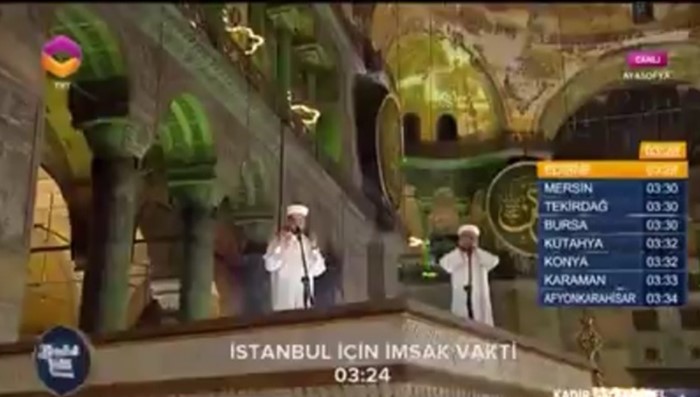The Turkish Foreign Ministry on Friday released a statement condemning the reaction of the Ministry of Foreign Affairs of Greece to the recitation of the Quran and call to prayer at the Hagia Sophia museum in Istanbul on Wednesday night, broadcast on television and attended by government officials.
Instead of extending its congratulations to the Turkish people on the holy month of Ramadan and the “Night of Power,” the Greek Foreign Affairs Ministry opted to distort the religious service held at Hagia Sophia, the statement said.
“The record of Greece in the field of freedom of religion, which is among the fundamental human rights, is well-known, the Turkish ministry said, citing a list of allegations of infractions of religious freedoms committed by Greece, including the absence of mosques available for worship in Thessaloniki.
“Therefore, one can question what Greece, which still does not have a mosque open for worshipping in its capital, either, understands from the interfaith dialogue that it has referred to in its statement,” said the Turkish Foreign Ministry.
In response to the holding of a Muslim religious ceremony at the famous museum, also a UNESCO World Heritage Site, earlier in the week, the Greek Ministry of Foreign Affairs had said: “This is a clearly unacceptable challenge to the religious sentiments of Christians everywhere and to all those who honor humanity’s cultural heritage, and it is taking place at a time when the interfaith dialogue should be promoted rather than undermined,” calling on Turkey “to conduct itself as a modern and democratic country, to protect the ecumenical nature of Hagia Sophia, and to respect the age-old tradition of this global monument.”
Turkey in response invited Greece to “be a modern and democratic country and respect all religions.”
On May 13 a large group of people from the pro-government Anatolia Youth Association (AGD) and National Youth Organization (MGV) gathered in front of Hagia Sophia for morning prayer and demanded that the museum be turned into a mosque again.
On May 20 the Sözcü daily claimed the Hagia Sophia museum would be converted into a mosque and that President Recep Tayyip Erdoğan and officials from the Justice and Development Party (AKP) would perform Friday prayers there.
Built in 537 by Byzantine Emperor Justinian, whose rule stretched from Spain to the Middle East, Hagia Sophia — meaning “Divine Wisdom” in Greek — was unrivaled in the Christian world until Ottoman Sultan Mehmet II conquered the city in 1453 and turned it into a mosque. Mustafa Kemal Atatürk, the founder of modern Turkey, decreed it a museum in 1934.

